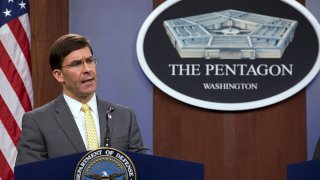
US Defense Secretary Mark Esper said Tuesday he is looking to NATO allies for more help countering the ISIS State extremist group in Iraq and in bolstering U.S. defense efforts in the Middle East more broadly.
In an interview while flying to Brussels to attend a NATO defense ministers meeting, Esper told reporters he wants NATO countries to do more to help Iraq’s security forces.
“As they put more forces in, that could allow us to decrease” the U.S. military’s workload there, he said.
Esper is looking for ways to reduce the U.S. troop presence in Iraq so that some can be brought home to focus on longer-term challenges, particularly from China. Similarly, he is considering pulling some troops out of Africa.
Get South Florida local news, weather forecasts and entertainment stories to your inbox. Sign up for NBC South Florida newsletters.
The U.S. now has about 5,000 troops in Iraq, continuing a years-long effort to train and advise Iraqi security forces to prevent an ISIS resurgence. There also are about 12,000 U.S. troops in Afghanistan more than 18 years after the U.S. invaded to topple the Taliban.
NATO leads a training mission in Iraq, but that contingent is at less than full strength.
Esper will be discussing Iraq, Afghanistan and other major defense issues at NATO headquarters on Wednesday and Thursday before attending an international security conference in Munich, Germany where some of the same issues will be on the agenda.
U.S. & World
Esper said that beyond Iraq, he wants NATO countries to contribute more to defense of the Gulf region, including by providing air defense systems in places like Saudi Arabia, which suffered a missile and drone attack last September that Washington has blamed on Iran.
Although NATO allies have long contributed to U.S. military efforts against extremists in Iraq, they have been more reluctant to get drawn into the U.S. campaign to counter Iran. The two issues have collided in Iraq, where the U.S. last month killed Iran’s most powerful general, Qasem Suleimani. The U.S. also has launched air strikes at Iranian proxy forces in recent months, following a series of attacks on U.S. interests in Iraq that Washington tied to Iran.
At the Brussels meetings, Esper is likely to face European questions about the Trump administration’s intentions on nuclear arms control. Some European allies have expressed skepticism about the wisdom of the U.S. decision to deploy a submarine-launched ballistic missile armed with a so-called low-yield nuclear warhead. Last week the Pentagon acknowledged that it had deployed that weapon for the first time.
The NATO allies also are wondering whether the Trump administration will take up a Russian offer to extend the New START treaty governing the number of deployed American and Russian strategic nuclear weapons. The treaty is set to expire in February 2021.



